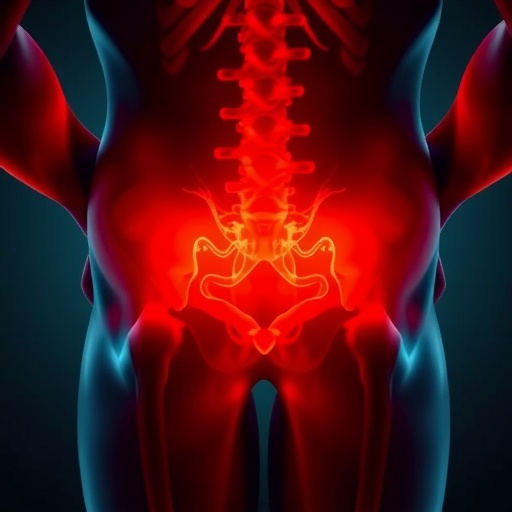In a groundbreaking study that merges the fields of gastroenterology and mental health, researchers have uncovered intricate connections between psychological disorders and a seemingly unrelated physical condition: hemorrhoids. Utilizing data from the extensive UK Biobank, the team led by Huang, Liu, He, and colleagues has illuminated the complex networks of depression and anxiety symptoms among patients suffering from hemorrhoids, challenging traditional perceptions of these common ailments.
Hemorrhoids, frequently dismissed as a minor and localized issue, have often been investigated primarily for their physical discomfort and complications. However, this recent investigation unveils an important psychological dimension, revealing that patients experiencing hemorrhoids frequently exhibit intertwined symptoms of depression and anxiety. The study leverages a sophisticated symptom network analysis approach, a method that maps how individual symptoms relate to one another rather than considering mental health disorders as isolated conditions.
The significance of symptom networks lies in their ability to expose interaction patterns that traditional diagnostic criteria might overlook. Instead of viewing depression and anxiety as monolithic illnesses, symptom network analysis treats them as complex systems where certain symptoms drive or reinforce others. For hemorrhoid patients, this means that psychological distress isn’t merely a co-occurring feature but is potentially embedded in the symptomatology associated with their physical condition.
To achieve these insights, the researchers mined data from the UK Biobank, a large-scale biomedical database that includes genetic, health, and psychological information on over half a million participants. This extensive dataset allowed the team to control for numerous variables and delve deeply into how mental health symptoms manifest in individuals with hemorrhoids, compared to those without.
The methodology involved constructing graphical models representing symptoms as nodes and the relationships between them as edges. This graph-theoretical framework enabled the identification of central symptoms — those with strong connections to others — which might serve as critical targets for clinical intervention. For hemorrhoid patients, symptoms such as sleep disturbances, feelings of hopelessness, and restlessness emerged as pivotal within the network, highlighting areas where therapeutic efforts might be most effective.
Importantly, the study goes beyond mere correlation. By analyzing temporal and conditional dependencies among symptoms, the researchers suggest possible pathways by which physical discomfort from hemorrhoids may exacerbate psychological symptoms and vice versa. This bidirectional influence highlights the necessity for integrated treatment approaches that address both physical and mental health simultaneously.
The findings resonate with a growing body of evidence that chronic physical conditions often co-exist with psychological disorders. However, this study uniquely uses advanced network analysis to disentangle the nuanced symptom interrelations specific to hemorrhoid sufferers, providing a more granular understanding than conventional mental health assessments.
Medical professionals typically encounter patients with hemorrhoids focusing on alleviating physical symptoms such as pain, itching, and bleeding. This research underscores the importance of screening for psychological distress in these patients, as unaddressed depression and anxiety may impair recovery, compliance with treatment, and overall quality of life.
From a neurobiological perspective, the results may hint at shared inflammatory or neurological pathways linking hemorrhoid pathology with mood disorders. Chronic inflammation, often present in hemorrhoidal disease, has been implicated in the pathogenesis of depression and anxiety through cytokine-mediated neural changes. This opens avenues for future research exploring immunomodulatory therapies that could simultaneously relieve physical and psychological symptoms.
Public health implications are equally profound. Hemorrhoids affect a substantial proportion of adults worldwide, and the uncovering of concomitant psychological burdens calls for heightened awareness among clinicians, as well as potentially redesigning healthcare delivery to incorporate mental health evaluations in gastroenterological settings.
Moreover, this study exemplifies the power of big data and advanced analytical techniques in medical research. By harnessing the UK Biobank, the researchers could validate their findings across a diverse population set, enhancing generalizability and strengthening the reliability of their conclusions.
The research team also advocates for future longitudinal studies to verify the causality and temporal sequencing implied by their network models. Tracking patients over time could determine whether intervening on central depressive or anxious symptoms might lead to better physical health outcomes in hemorrhoid patients.
This intersectional study further challenges the stigma frequently associated with hemorrhoids and mental health issues alike. By revealing the complex psychosomatic experience of patients, it promotes empathetic clinical practices and encourages patients to seek holistic care without embarrassment.
In summation, Huang et al.’s work represents a pioneering stride towards elucidating the psychosomatic intricacies of hemorrhoids through the lens of symptom network analysis. It beckons clinicians and researchers to reconceptualize the management of common physical ailments within the broader context of mental health, fostering integrative approaches that could transform patient care and alleviate the dual burden of physical and psychological distress.
This innovative research not only contributes fundamental knowledge to the scientific community but also holds promise for tangible improvements in clinical protocols and personalized medicine approaches. The integration of symptom network insights into healthcare could revolutionize how we diagnose, treat, and understand the interplay between mind and body in everyday conditions.
As we continue navigating the complexities of human health, studies like this remind us that no symptom or condition exists in isolation. Rather, they form part of a dynamic, interconnected system that demands equally nuanced and comprehensive strategies to promote wellness and resilience.
Subject of Research: Depression and anxiety symptom networks in patients with hemorrhoids.
Article Title: Depression and anxiety symptom networks in hemorrhoid patients: evidence from the UK biobank.
Article References:
Huang, Z., Liu, X., He, Y. et al. Depression and anxiety symptom networks in hemorrhoid patients: evidence from the UK biobank.
BMC Psychol 13, 1017 (2025). https://doi.org/10.1186/s40359-025-03170-5
Image Credits: AI Generated




